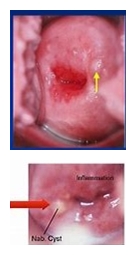 Mrs D was devastated. She had a vague feeling of lower abdominal fullness for the past week and had discovered a lump on her cervix. She had a distant aunt who had died of cancer of the cervix and so was understandably concerned. This anxiety was greatly compounded by the fact that her first born baby was just six weeks old. Like many women she found it difficult to talk about any issues to do with her personal health especially when it came to matters of such a delicate nature. Now she was at her doctors’ office for a routine postpartum check up. She waited for the doctor to confirm her worst fears but he smiled and said ” No need to worry my dear. It is just a nabothian cyst Between the tears she asked:
Mrs D was devastated. She had a vague feeling of lower abdominal fullness for the past week and had discovered a lump on her cervix. She had a distant aunt who had died of cancer of the cervix and so was understandably concerned. This anxiety was greatly compounded by the fact that her first born baby was just six weeks old. Like many women she found it difficult to talk about any issues to do with her personal health especially when it came to matters of such a delicate nature. Now she was at her doctors’ office for a routine postpartum check up. She waited for the doctor to confirm her worst fears but he smiled and said ” No need to worry my dear. It is just a nabothian cyst Between the tears she asked:
“What is a nabothian cyst?”
A nabothian cyst is just a mucus filled cyst which can be found on the surface of the cervix at the neck of the womb. As it contains mucus it is sometimes called a retention cyst.
“Is it serious?”
Nabothian cysts are not serious. They rarely cause any problems and are not cancerous.”
“Why did I get it?”
The healthy cervix is lined with glands that release mucus. This mucus can become blocked within the glands if there is overlap between two types of cells that normally meet at the cervix (the stratified squamous epithelium near the vagina and the simple columnar epithelium near the uterus).
“Why did I get it now? I never had one before.”
These cysts are most common in women who have had children or women who are menopausal. They are really common.
“What are the symptoms of a nabothian cyst?”
Most women have no symptoms at all. Very rarely they can cause some irregular bleeding or a feeling of fullness in the abdomen
“Do I need to have treatment?”
These cysts are entirely benign. They rarely if ever cause any problems and usually are self resolving. In fact the vast majority of these cysts even go undetected.
“Does this affect my chances of becoming pregnant again and having a health pregnancy?’
Nabothian cysts have essentially no impact on fertility unless they are really large and are causing physical distortion of the cervix.
“If I ever did need to have treatment, what would that involve?’
In the extremely rare event that you did need treatment then it would just involve either electrocautery or cryotherapy”
“How can I prevent ever getting another cyst like this?’
There is no prevention necessary.

